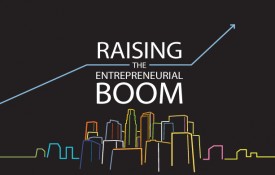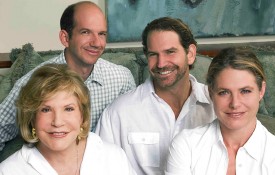There is a yearning for some semblance of normalcy and workplace culture that we’ve missed out on during the quarantine. As a result, co-working spaces have emerged as an alternative workplace option for entrepreneurs to launch and grow their businesses, as well as for companies that have lost permanent office locations due to COVID.
While some co-work spaces have consciously adapted to our changing world, new member preferences, and behaviors, others have struggled to meet the shift. Over the past 10 months, there has been an increased consolidation of the market, with some social membership clubs closing permanently, such as H Club. As we’ve seen in the news, others, like WeWork and The Wing, are still operating but are experiencing severe business challenges. Although it’s worth noting: Several of these companies were struggling before COVID, too. There is a clear polarization of the co-working model: The market demands high-end, welcoming, and curated membership clubs, as well as lower-tier, function-oriented “desk capacity” options. For co-working and members clubs to thrive, they need to meet members where they are and provide scalable options, understanding that one size never fits all.
Speaking to the high-end segment specifically, there is a shift in member preferences for more flexible rental options. Pre-COVID, it was standard to sign a 12-month private office lease. Now, more renters are looking for flexible options with regard to contract length and type of space. We see it firsthand with some of our most loyal members. At Spring Place, we’ve introduced a Flex+ model that caters to this new need. Just as with ride-share commuter models, renters only pay for their usage. This model allows for a flexible week-to-week contract, eliminating the need for a hefty annual fee or extended membership commitment. For example, one of our members rents one office twice per week and only pays for the usage of those two days. Another member rents a big conference room every Friday for his team, which otherwise works remotely from their respective homes. For him, we’ve created a tailored package suited for his team model, with catering included, pending COVID restrictions.
During a crisis, the key is clear and honest communication—with members (both current and prospective), investors, and employees.
One of the biggest mistakes co-working spaces and members clubs have made during the pandemic is an overemphasis on short-term financial gains. By continuing to charge members during lockdown and refusing to introduce flexible options once businesses reopened, too many clubs invited backlash and severe membership drop-off. This has proven fatal to a number of business models in the industry and is ultimately the reason that many have either shut down or are still struggling. This is not only damaging financially but it also eliminates the club’s community and affects the overall atmosphere in a negative way. At Spring Place, we froze accounts for our members during the lockdown and provided F&B credits once our restaurants reopened. Members respond to proactive, human touches like this, which not only create a sense of trust that their best interests are a priority, but also allows them to return to the club and continue to enjoy the space with a custom membership model that meets their needs.
While it’s been a difficult year for businesses across a multitude of industries to raise capital, without a doubt hospitality is one sector that has experienced the most challenges in this area. The uncertainty of when things will revert back to normal has made investors hesitant. However, a majority of the businesses that were profitable before COVID will regain momentum after COVID. Investors understand this and look at pre-COVID numbers to gauge how businesses perform. It’s a valley we have to go through as an industry, but there is light at the end of the tunnel. During a crisis, the key is clear and honest communication—with members (both current and prospective), investors, and employees. By being transparent in our communication, we establish trust, learn what our clients want and need, and are able to work together to adapt.
Despite the challenges of this past year, our society as a whole is experiencing a shift that is not about to change any time soon—a vast majority of people do not want to go back to regular offices. They also don’t want to continue working remotely. Cracks have emerged in the nebulous digital foundation, and creativity levels dwindle when people aren’t given the proper space they need to feel comfortable and inspired, or the opportunity to collaborate with other creative forces. For offices that do eventually reopen, the environment and overarching concept of work will continue to change. People have become accustomed to flexibility and standard 9 to 5 operations will need to adjust to meet the evolving work landscape.
In vibrant cities like New York and L.A., residents thrive on the ability to connect. Remote work will never replace the creativity and energy created when people come together and share.














































